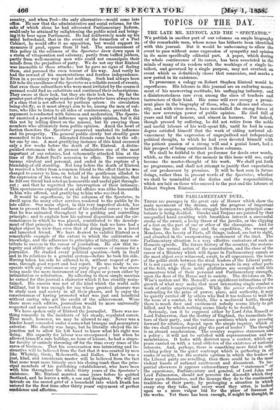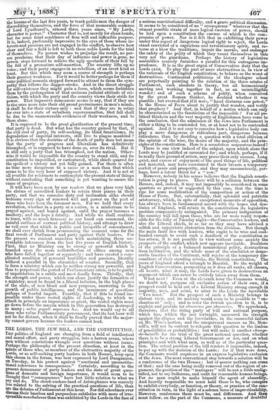THE PARLIAMENTARY DUEL.
THERE are passages in the great epic of Homer which show the main movement of the drama and the progress of important battles in suspense, while the struggle between two principal com- batants is being decided. Greeks and Trojans are painted by that unequalled hand awaiting with breathless interest a successful stroke of the sword, a lucky throw of the javelin, or the slipping of a foot on the part of one or other of the champions. And for the time the fate of Troy and the expedition, the wrongs of Menelaus, the beauty of Paris, all things, indeed, are lost to sight, and absorbed in the overpowering excitement of the duel. The Parliamentary, situation is a very effective caricature of such an Homeric episode. The future history of the country, the restora- tion of the normal action of the constitution, and the close of the career of a Ministry which will figure in Parliamentary annals as the most abject ever witnessed, await, to all appearance, the issue of the polite strife between the rival leaders of the Liberal party. It is not exact to say that no progress is made in any other parts of the field, while these noble gladiators are occupied with this momentous trial of their personal and Parliamentary strength, upon the floor of the House and in society. The divisions on Mr. Wise's motion and Mr. Monsell's are significant intimations of the growth of what may make that most interesting single combat a work of entire supererogation. While the preux chevaliers are contending for the prize of power, place, and authority, it may be quietly carried off by others who find it too tedious to wait for the issue of a combat, in which, like a mediceval battle, though there is much dust and excitement nobody seems likely to get killed, and by which nothing seems likely to be decided.
Seriously, can it be supposed either by Lord John Russell or Lord Palmerston, that the destiny of England, the immediate fu- ture of their party, and the various questions which are pressing forward for solutiou depend upon the simple inquiry, which of the two shall henceforward play the part of leader ? The thought is an absurd anachronism. The country requires statesmen and a policy ; it will not be satisfied with superannuation and re- membrances. It looks with distrust upon a contest, which ap- pears carried on with a total oblivion of the existence of national interests. And, perhaps, there is something more fatal to self- seeking policy in the quiet contempt which is gathering in all ranks of society, for the ecstatic egotism in which the leaders of the Liberal• party are revelling, than there could be in the most violent bursts of national excitement and discontent. To im- partial observers it appears extraordinary that "statesmen" of the experience, Parliamentary and general, of Lord John and Lord Palmerston, should not perceive the discredit which they draw upon themselves, and the damage they do to the continuous traditions of their party, by prolonging a situation in which every step they take, and every word they utter, is looked upon as a mere vulgar bid for the place of foreman of the works. Yet there has been enough, it might be thought, in
the lemma of the last five years, to teach publiemen the danger of discrediting themselves, and the force of that memorable sentence of Lord. Lyndhurst's, uttered three years since, "My Lords, character is power." Character that is, not merely for clean hands, but for some faint semblance of firm will and inflexible purpose. It is indeed, profoundly impressive to the eyes of those whose in- tereas and passions are not engaged in the conflict, to observe how clear and fair a field is left,to both these noble Lords for the trial of themselves. No person wishes to prejudge the result, no per- son proclaims that their day of influence and power is gone, no person steps forward to relieve the ugly spectacle of their fall by the foil of a premature self-assertion. The country lifts up no voice; and. their party engages in no rebellion, of an overt kind at least. But this which may seem a source of strength is perhaps their greatest weakness. For it would be better perhaps for them if some political assassin stepped forward to attract to them the sym- pathy that follows the dagger-stroke. And in the direct struggle for self-existence they might gain a force, which seems forbidden them by the prolongation of that ominous judicial attitude of cri- ticism, with which the party and the country views their strife for power. That impassive demeanour seems to say, that if they are to rise once more into their old proud preeminence in men's minds, it shall be for their virtues only : and that if they are to retire for ever into a state of subaltern. superannuation, that fall shall be due to the unanswerable evidences of their weakness, and to those alone.
It is supposed to be the great glorification of the present time, that party is dead. But what has the country gained by that, if the evil soul of party, its self-seeking, its blind fanaticisms, its de gradation of imperial interests still live to plague mankind ? It is obvious that the doctrine of interests, death of party does but mean that the party of progress and liberalism has definitively triumphed, or is supposed to have done so, over its rival. But it is still only a party that has triumphed, not the nation. Other- wise it would be impossible for the country to stand still, and its constitution be imperilled, or caricatured, while chiefs quarrel for the spoils of a victory not yet fully gained. For there is often no time more dangerous to a cause or a man than that which seems to be the very hour of supposed victory. And it is not at all possible for reformers to contemplate the present state of things without concluding that something is yet wanting to assure the cause of progress.
It will have been seen by our readers that we place very high the claims of accredited. leaders to retain their places in their party, and that we conceive duty and inclination alike should welcome every sign of renewed will and power on the part of those who have been the foremost men. For we hold that every revolution, whether in a party or a nation, is a misfortune to be prayed against, and hoped against, until the prayer becomes a mockery, and the hope a fatuity. And while we shall continue to trace, with as much firmness as our hand can command, the painful outlines of current political history, and attempt to draw no veil over that which is public and incapable of concealment, we shall ever shrink from pronouncing the moment come for the final revolt of Parliament and party against their leaders. For the present we content ourselves with maintaining these un- avoidable inferences from the last five years of English history. First, that no Ministry can be strong or powerful which is founded upon the mere redistribution Of offices among men who have failed together or separately : and have created. a com- plicated condition of personal hostilities and passions, literally without a parallel in the chronicles of senates. Secondly, that to form a ministry which can be neither strong nor powerful, and thus to perpetuate the period of Parliamentary crisis' is to be guilty of nnpatiotism in a subtle and most deadly form. Thirdly, that the strength and power, which can alone justify the formation of a ministry, must be found in a liberal infusion, in the high places of the state, of new blood and new purposes, answering to the growth of public intelligence, and the imminence of questions perhaps of fearful import. Fourthly, that if this be found im- possible under those vested rights of leadership, to which we attach in principle an importance so great, the vested rights must go down before the maxim which in this generation has destroyed. so many ; salus populi suprema lex. And we would say to all those who value Parliamentary government, that its last hour will not be far distant, when it shall be finally proved that the major- ity cannot govern because the leaders cannot lead.



































 Previous page
Previous page